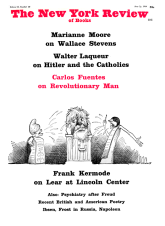In response to:
On Linguistics from the May 14, 1964 issue
To the Editors:
Because I suspect that Mr. Goodman has much to say that is intelligent and subtle, I deplore the linguistic convulsions he seems unable to avoid. His review of A Linguistic Introduction to the History of English is obscure, contorted repetitious, and vague…To give one example, Mr. Goodman interrupts himself parenthetically three times in one paragraph (page 10, column 4), and his interjections form one-fourth of the total paragraph.
The use of a battery of needlessly violent epithets makes his prose tire-some, e.g., “the authors mean to include themselves in the aggressive and prestigious battalion of scientific structural linguistics.” This sort of over-writing is not only wearying but it is unfair. The reader is able to reach his own conclusions; Mr. Goodman need not try to ram an attitude down his throat by the use of terms such as “aggressive” and “prestigious.” The violence of language…does not convince me, and I believe it has probably annoyed many others.
Finally, either Mr. Goodman, or the editors for him, should have clarified references and eliminated the strings of abstract gobbledygook that hold the examples together. Surely, “that” in “They finally mean by a language, that of which they have constructed a simple grammar” is unclear on a first, and probably on a second, reading. Mr. Goodman could have written, “They isolate certain features of a language, construct a grammar of those features, and then define the original language as that grammar.” Of course, this may not be what Mr. Goodman means to say, but it is the only idea that it seems possible to extract from the sentence. Mr. Goodman might also take a look at his use of prepositions. “By” in “They finally mean by a language” is misleading. The meaning “through” hovers in the background. Get rid of the preposition: To them, a language is anything for which they have constructed a simple grammar. Though awkward in comparison with the above formulation, it is at least unambiguous. It is also, notice, perfectly true in a fuzzy sort of way. Anything for which a grammar is constructed is a language; Mr. Goodman does not clearly indicate that grammars formulated by structural linguists describe a language not spoken. There’s the rub.
Following his criticism of such abstract and simplistic descriptions of language, Mr. Goodman should have discussed those features of language that he feels are omitted by such a grammar. Instead he offers an only glancingly relevant gibe at mathematical economists and their role in politics. That gibe should have been saved for another review, or an article. His petulance distracts the reader and weakens his argument…. The pity is that bad writing drives out good thinking, a commodity we have too little of to waste.
Stuart Silverman
University of Illinois
Paul Goodman replies:
My review is not gracefully or eloquently written, but it is orderly and clear enough. If it perhaps contains “much that is intelligent and subtle,” in 3000 words, certainly I, as a reader, would be willing to read it two or three times. My writing is often impatient, but that is a defect of my character that cannot be assuaged by berating me but only by stroking my brow and feeding me sherbets and so forth.
Mr. Silverman is wrong about the parentheses. In that paragraph I interrupt myself only once; the other two sets of parentheses could well have been stricken by the editor without a squawk from me.
Nay, the scientific structural linguists are an aggressive and prestigious battalion; there is no overwriting or unfairness. I don’t know the particular climate at the University of Illinois, but I would be curious to know, nationally, the comparative grants-in-aid to the various schools of linguistics.
Finally, my sentence might have read, “They mean by a language the following: that of which they have constructed a simple grammar.” I inserted the comma after “language” to ask for the slight pause. Mr. Silverman accurately paraphrases it by, “To them, a language is anything for which they have constructed a simple grammar.” Unfortunately, however, he then misses the point, which is my next clause, “but they call it English.” I have not yet gotten to the notion of speaking vs. language.
The analogy with the mathematical economists is by no means “glancingly relevant” but exactly pat. “Calling it English” is analogous to “calling it political economy” and “influencing our communications”—this is the animus of my review—is analogous to “advising the President.”
A similar exact analogy is to the games-theory approach to nuclear war, which excludes the political possibility of moral revulsion or the occurrence of plain sense. The relevance is that, in my opinion, these three political contexts, of communications, economy, and war-policy, will determine the shape of the future, and in all three analogous errors have been in the ascendancy, omitting factors that resist abstraction and carrying the calculus of the abstractions too far.
This Issue
June 25, 1964



